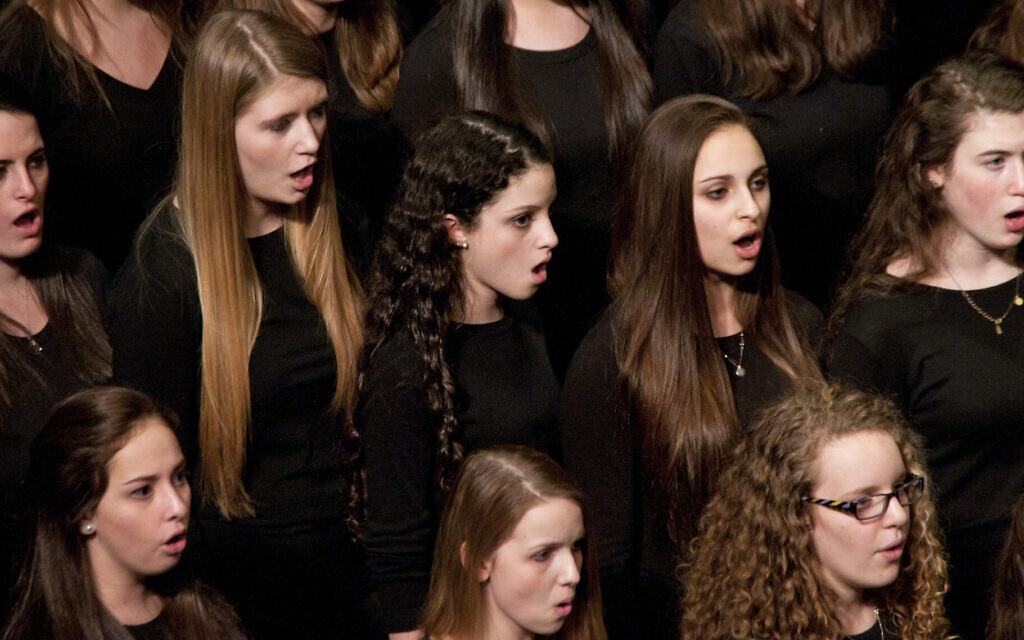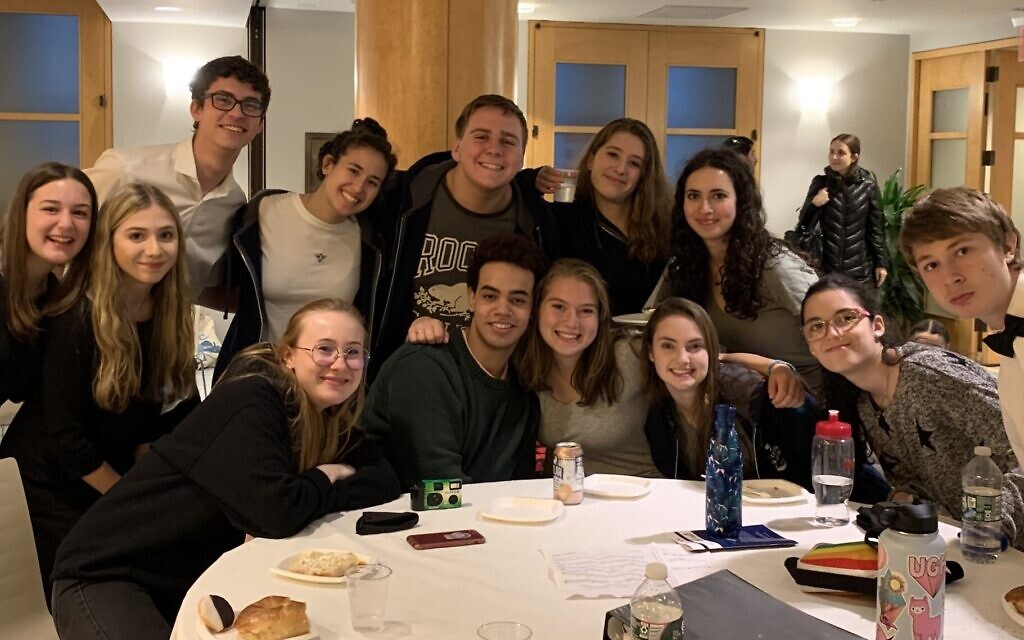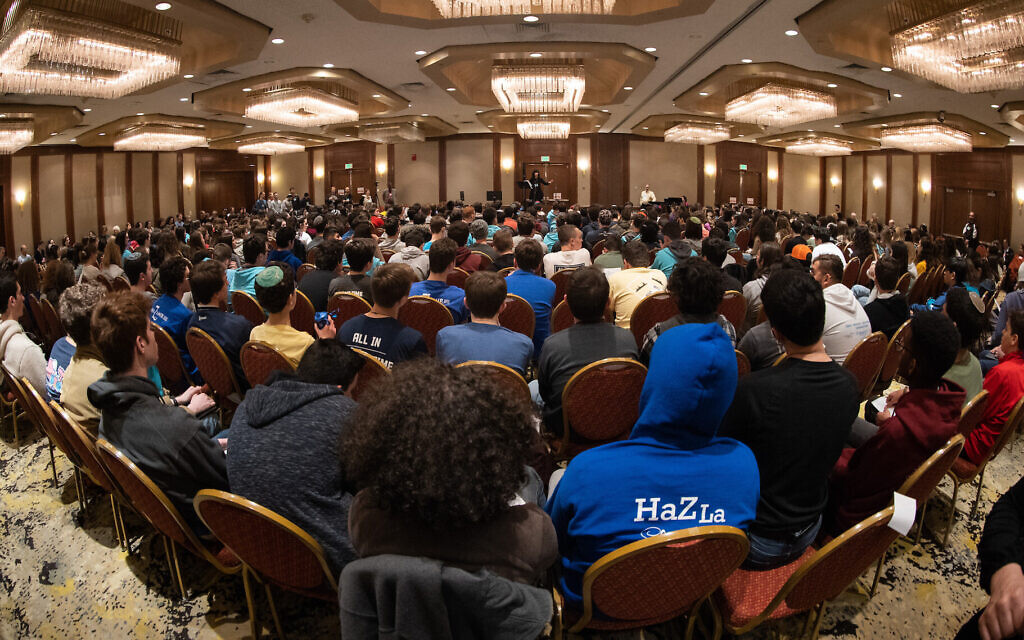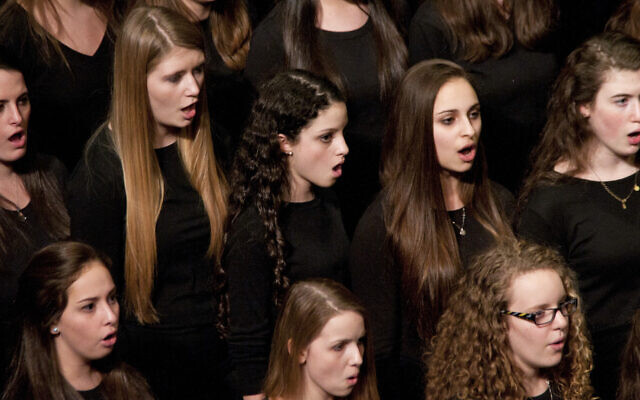How HaZamir youth choir serves as ‘an on-ramp to Jewish life’
450 teens in 36 chapters across the US and Israel take part in the musical program focused on pluralism, community and Zionism; they convene this weekend for a concert in NYC
 HaZamir singers at the 2013 Gala Concert. (Courtesy HaZamir via JTA)
HaZamir singers at the 2013 Gala Concert. (Courtesy HaZamir via JTA) Mati Lazar conducts HaZamir singers during the 2017 Gala Concert at the Metropolitan Opera House. (Courtesy HaZamir via JTA)
Mati Lazar conducts HaZamir singers during the 2017 Gala Concert at the Metropolitan Opera House. (Courtesy HaZamir via JTA) HaZamir singers performed a concert at the Tree of Life synagogue in Pittsburgh to commemorate the one year anniversary of the deadly shooting that took the lives of 11 synagogue members. (Courtesy HaZamir via JTA)
HaZamir singers performed a concert at the Tree of Life synagogue in Pittsburgh to commemorate the one year anniversary of the deadly shooting that took the lives of 11 synagogue members. (Courtesy HaZamir via JTA) Over 400 students attended HaZamir’s 'Festival' in 2019. (Courtesy HaZamir via JTA)
Over 400 students attended HaZamir’s 'Festival' in 2019. (Courtesy HaZamir via JTA)
New York Jewish Week — All across the country, groups of Jewish teenagers meet each week to rehearse as a choir. In groups as small as two and as large as 18, they gather in synagogue basements, Jewish community centers, senior centers and even churches to sing together. For many, it’s their only involvement with Jewish life.
These 450 young people, who range in age from 13 to 18, are members of HaZamir, an international choir for Jewish high school students. With 26 chapters in the United States and 10 in Israel, they convene each year for a spring concert in New York City.
But this coming concert — to be held on Sunday, March 19, at Lincoln Center’s Frederick P. Rose Hall — will be different than that of most years. This weekend’s celebration, which includes more than 300 student and alumni singers, will commemorate HaZamir’s 30th birthday as well as the 75th anniversary of the founding of the State of Israel.
“The idea behind the creation of HaZamir was to give Jewish teenagers the opportunity to have a high-level music experience and to express their Jewish selves and their music selves,” said Mati Lazar, HaZamir’s conductor and founder. “At that point, and even now, [that] is not really a given.”
Sunday’s concert will include performances by the entire ensemble, as well as songs performed by the Israeli cohort and members of the Chamber Choir, an elite group of HaZamir singers. (Students have to audition to join HaZamir, and select singers are invited to audition for the Chamber Choir.) The highlight is always the “senior song” — “Yachad Na’Amod” (“Together We Stand”), said Vivian Lazar, Mati’s wife and the director of HaZamir.
“This is a problem with any high school teacher — you fall in love with your 12th graders,” Vivian told the New York Jewish Week. “They’re adults already. They’re smart, and they’re intuitive and then they leave you. For the last verse, they put their arms around each other. Some of them don’t sing because they’re crying so hard.”

Mati Lazar, who declined to provide his age, founded HaZamir in 1993 as the high school arm of the Zamir Chorale, a professional Hebrew-language choir and Jewish choral performance group in North America that was established in 1960. A native of Brooklyn, he had been a member of Zamir Chorale as a teenager, and wanted to create an opportunity for other young people to have the same experience.
Starting with just one small chapter in New York — which Mati personally ran — he watched it grow, and grow, over the next three decades. “I knew it would be important — I knew it would evolve into what it has evolved into,” Mati said. “The surprise for me was how successful it would be in Israel.” The first Israeli chapter was founded in 2006.
He is also the founder and director of Zamir Choral Foundation, the umbrella organization that operates HaZamir and Zamir Chorale, as well as a choir for middle schoolers and a choir for young adults in their 20s and 30s.
Though HaZamir is an extracurricular activity for these high schoolers, the Lazars place serious demands on their members. “We empower these teenagers,” Vivian Lazar said. “When they go and have free time together, they’re kids. When they’re sitting in rehearsal, we treat them like professionals, and so they behave that way.”
As a result, participating in the choir can often become a lifelong commitment — and sometimes even a family affair. Sophie Lee Landau grew up in New York listening to her mother perform as a member of Zamir Chorale. Landau joined HaZamir in seventh grade and stayed with the group throughout high school. In college, she became a member of Zamir Chorale for a number of years until she moved out of New York in 2015.
For the past six years, Landau, 29, has been the conductor for the Houston-based chapter of HaZamir. “It’s an opportunity to connect with your peers who have come from a similar faith and to connect more to Jewish text,” Landau told the New York Jewish Week. “It’s really special to be able to give [students] an outlet to connect to their heritage and to find peers and friendships with similar interests and similar backgrounds. It’s about not feeling like you’re alone.”
The Lazars see the choir as “an on-ramp to Jewish life” with an emphasis on pluralism, community and Zionism. HaZamir is not designed to be religious, Vivian explained, though she suggested that singing together in harmony is often a spiritual experience.
However, “to be Jewish is to be literate,” Vivian said, adding part of being in the choir and learning to sing the Hebrew music includes learning the texts and their meanings.

“The more you know about your history and your tradition and your culture, the better human being you can be,” Vivian said she tells her students.
For participants, these principles culminate during “Festival,” a Shabbat sleepover that takes place in the days leading up to the annual concert. This year, the group congregated at a hotel in upstate New York.
“Festival” is the first time chapters from around the world meet after having rehearsed the same songs as individual groups throughout the year. “It is a spiritual kind of experience singing music together: You’re breathing together, you’re thinking about the same text at the same time, and you’re making harmony,” Mati Lazar said. “All differences really subside.”
According to Landau, the weekend is especially rewarding for participants who hail from smaller Jewish communities. “This is the one opportunity for the kids to all get together,” she said. “Once you get together and you sing with 300 other kids, the sound is overwhelming. It’s the thing that they look forward to most, after working hard all year they finally get to put it all together and hear what the music can do.”
Though it’s meant to be a rehearsal boot camp for the teenagers, Festival also aims to nurture the cross-country and international friendships that are made on Zoom throughout the year. Activities include a Thursday-night jam session, hours of rehearsals during the day and a range of Shabbat services on Friday night and Saturday morning — egalitarian, Orthodox, Reform, and all-women services are among the options. For many participants, Vivian said, it’s the first time they can explore these different types of Jewish religious expression.
For Milo Shaklan, a senior in HaZamir’s Brooklyn chapter, whose ninth and tenth grade concerts were canceled due to COVID-19, going to Festival and the Gala concert for the first time last year was “a moment of understanding,” he said.
“I got to connect with all these other Jews,” Shaklan said. “I had no idea how big the community was. When I’m interacting with people in my synagogue community, I am interacting with people who more or less observe like me. At HaZamir, I’m interacting with Americans who are less observant than me and Americans who are more observant than me, and then Israelis who are both more and less observant than me.”
Landau concurs. “To be able to establish such a network is really incredible, and that’s why this weekend is so important,” she said.
For the Lazars, it’s alumni like Landau — who has maintained a long-term relationship with the choir — who are the biggest reward for the efforts. This year, 14 HaZamir alumni are now conductors of their own chapters, and all HaZamir alumni will be invited on stage to sing during the second half of the two-hour concert.
“It’ll be a very, very beautiful moment,” said Vivian.
The HaZamir 30th Anniversary Concert will take place on March 19 at 3 p.m. Eastern Time. Buy tickets here.
There's no paywall on The Times of Israel, but the journalism we do is costly. As an independent news organization, we are in no way influenced by political or business interests. We rely on readers like you to support our fact-based coverage of Israel and the Jewish world. If you appreciate the integrity of this type of journalism, please join the ToI Community.

We’re really pleased that you’ve read X Times of Israel articles in the past month.
That’s why we started the Times of Israel eleven years ago - to provide discerning readers like you with must-read coverage of Israel and the Jewish world.
So now we have a request. Unlike other news outlets, we haven’t put up a paywall. But as the journalism we do is costly, we invite readers for whom The Times of Israel has become important to help support our work by joining The Times of Israel Community.
For as little as $6 a month you can help support our quality journalism while enjoying The Times of Israel AD-FREE, as well as accessing exclusive content available only to Times of Israel Community members.
Thank you,
David Horovitz, Founding Editor of The Times of Israel










